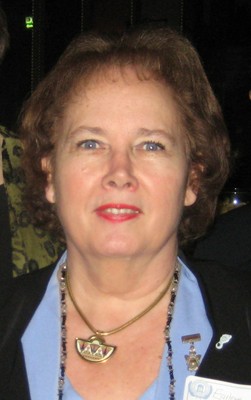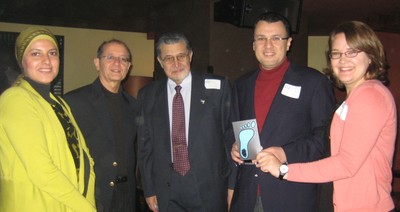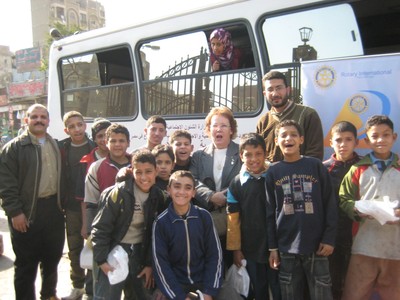Earlene Gentry ’71

Earlene Gentry ’71 has lived in Egypt for almost 40 years. As a civilian, she experienced the effects of the revolution on citizen’s lives. Here, she discusses what the revolution means for her, her family and friends.
When the January 25th Revolution in Egypt occurred, unlike the rest of the world, Earlene Gentry—a self-described North Carolina country girl—was not entirely surprised. After all, this country girl had been living in Egypt for the past forty years and was well aware of the nation’s need for change.
Change, in fact, is one area in which Gentry has become somewhat of an expert. Ever since entering UNC Chapel Hill in 1967, her life has been an exercise in how to adapt.
Gentry enrolled as one of the first female freshmen at UNC, during a period of great social transformation. She’d declared a major of Medical Technology, but soon found the long and quiet labs inside the classroom torturous. “I was discovering I am a ‘people’ person,” Gentry said of that first year, “and I needed more social interaction than labs were providing.”
Gentry also struggled to focus on her labs as she became increasingly interested in world affairs. Her classmates were fighting in Asia at the time and the campus was alive with Vietnam protests and demonstrations for voting rights for 18 year olds. Gentry began typing papers for international students and attending public lectures—where she in fact met her future husband, Atef Khalifa.
After spending a summer in Morocco in 1968 and then visiting Paris where refugees from the Soviet invasion of Czechoslovakia camped along the Seine, Gentry changed her major to International Studies, with a concentration in global economics. She wanted to research political systems, geography, comparative religion, sociology, anthropology; she wanted to understand how countries functioned.
“The curriculum […] was flexible enough to allow amazing things to happen—special courses were organized and the books we read made me feel on top of the world. Definitely I felt prepared for being flexible in my thinking—and that is exactly what life had in store for me.”

Gentry married her husband Atef Khalifa, a ’71 Ph.D in Demography, in Egypt in June of 1972. She had only visited the country once before that previous fall to meet her husband’s family.
Khalifa worked for both Cairo University and the United Nations, so Gentry regularly moved her family between countries in the area. She integrated herself into each society as best she could, often teaching in the schools her children attended. But mostly, she lived in Cairo, where although she looked like a khowagia (foreigner), she rapidly became Egyptian in word and deed.
Gentry learned Arabic and how to act according to the social customs of the country to assimilate with family and friends. Her husband’s aunt indeed once said to her, “You are so much like us in feelings and values that you must actually be an Egyptian who was born by mistake in America.”
This is perhaps why Gentry was well aware that change in her adopted country was imminent. But even she was not prepared for how the revolution would develop. Gentry had expected the uprisings to occur over economic issues such as unemployment, poor education and low incomes not meeting rising costs. The inspiration from Tunisia, however, shifted the focus to political concerns.
But on the ground, the political issues at the heart of the revolution were less visible. Since the military was not firing on civilians, many did not try to flee the country and instead opted to look after their families at home. While their phones and internet were cut off, leaving relatives overseas worried, the greatest fear was in fact the looting and violence of escaped prisoners who stole firearms from abandoned police stations. To counteract these gangs, neighborhood watches were established and areas blockaded. Food was also a concern as many shops were ransacked. Gentry managed to keep her family supplied through selective and careful shopping at smaller stores. All this was largely possible thanks to the labor of civil workers.
“Of major importance is the fact that some brave workers kept us all in electricity and water throughout all this—I am eternally grateful to them for their dedication,” Gentry said.

Since the revolution, more mundane matters have once again proved problematic in daily life. Prices have increased and there is a shortage of gasoline and distribution of basic items such as gas containers. The country suffers from gross unemployment, partially owing to a lack of tourism and the return of millions of workers fleeing from conflicts in Libya, Tunisia and Iraq.
For Gentry, these issues return to the fundamental problem she and her husband have researched for years: population increases. “There are too many people in Egypt for the available resources, whether that is arable land, land for building the needed housing, water and so on.”
During Gentry’s life in Egypt since 1972, the population has increased from around 30 million to 80 million, yet potential areas for habitation have not changed.
In the face of scarcity and inequality, Gentry understands the appreciation many of the poor have for religious extremist groups. “They are doing much to help the poor, jobless and those who need medical help by offering money directly, food packages and inexpensive medical tests and treatment,” Gentry admits.
“Whoever [is elected] will be facing massive infrastructural problems,” Gentry said, for population growth continues to plague the nation as resources remain tight. Meanwhile, many social programs are on hold and few international agencies are starting new ventures.
But Gentry claims the atmosphere in Egypt is optimistic. “Everyone is full of ideas,” Gentry said. “The youth who claim to be behind the revolution are enthusiastic to continue on their unclear and bumpy path.” Many higher level thinkers behind the scenes are pessimistic, of course, and predict many years of continued lawlessness before any elected leader can once again direct the country towards progress.

But Gentry seems excited for the future. She continues to mentor English teachers in Egypt through her work with international TESOL (Teachers of English to Speakers of Other Languages) and hopes to find more ways to engage in social responsibility and character education. After all, this country girl is always prepared to embrace change.
